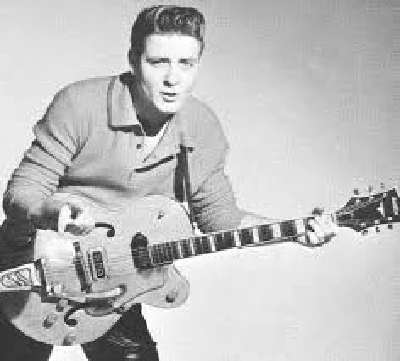published: 26 /
5 /
2023

'Baby boomer' Bob Nicholson, enjoyed popular music of the late 50’s and early 60’s; he didn’t learn life lessons from their messages, but considers the songs 'all good'.
Article
As a baby boomer, I grew up with rock and roll in its widest sense, from Jerry Lee to Bobby Vee. This was our music. All the hopes and anxieties of my teenage years were represented here. The same issues were reflected in the songs of our parents’ generation but not, I argue, specifically for teenagers. Our growing affluence created a market for songs aimed at us.
What did the writers have to say about the major issue in my life, outside football and cricket, namely the opposite sex? I recall the girls were both chaste and chased which seemed a safe, if frustrating, combination at the time. The message back then was the preservation of innocence, soon to be eroded by the more permissive times of the mid– Sixties. What was I being told by those early pop songs?
Desire, danger and defeat; hope, heartache and (brief) happiness. The first 78 I played constantly on my mate’s record player was ‘Diana’ (1957), fifteen-year old Paul Anka’s plea to the older woman: "I’m so young and you’re so old...." This song transfixed me. Was it acceptable to fancy my friends’ big sisters or, even worse, their mothers? What about the women on my grocery round? Mind you, I suppose, old to him might be someone in their mid-twenties.
‘Diana’ was a confusing start, but the Everly Brothers clarified societal norms. Age was a key factor. In ‘Maybe Tomorrow’ (1957), parents make the young couple part but "our love will stand the test of time, and our ages won’t be there to draw the line."
It was ironic that Jerry Lee Lewis was marrying his 13-year old cousin that year. In ‘Wake Up, Little Susie’ (1957), the couple fall asleep at the drive-in: "we fell asleep, our goose is cooked, our reputation is shot," and "what are we gonna tell our friends when they say ‘ooh, la la." Well, quite. Ricky Nelson was in trouble too in ‘It’s Late’ (1959): "I hate to face your dad, too bad, I know he's gonna be mad."
Rule one, then, get the girl home on time. Rule two is how to behave. No issue there, I had a half-Irish mother. What was the advice from the hits? Elvis wasn’t helpful. In ‘Treat Me Nice’ (1958), he demands: "when I walk through that door, baby, be polite, you’re gonna make me sore, if you don’t treat me right," and "if you don’t want me to be cold as ice, treat me nice."Try that today, Elvis! The boot’s on the other foot.
Dion learnt his lesson with ‘Runaround Sue’ (1961):"‘people let me put you wise, Sue goes out with other guys." Fidelity seemed to be an issue so Dion became ‘The Wanderer’ (1962). He wasn’t a role model, however: "I kiss ‘em and I love ‘em ‘cos to me they’re all the same, I hug ‘em and I squeeze them, they don’t even know my name’." No wonder he had to move on. There’s a name for that today.
Occasionally, the chased would let you catch up. The thrill of it all was matched by the competition. If you found her gorgeous, so did the circling hunters with better hair, better clothes and more spending money. Melancholy awaits. Was Conway Twitty reading my palm in ‘It's Only Make Believe’ (1959)? "People see us everywhere, they think you really care, but, myself, I can’t deceive, I know, it’s only make-believe."
Eddie Cochran learned the lesson in ‘Somethin’ Else’ (1959):"‘look a there, cross the street, there goes that girl again, wanted to date her since I don’t know when, but she don’t notice me, when I pass, she goes with all the guys from out of my class, but that can’t stop me from thinking to myself, that girl’s fine looking, man, she’s somethin’ else.’"
So, he works hard, saves up and gets the car and thus the girl. It’s a forty-one Ford, not a fifty nine, but it’ll do! No help to me, I was too young to drive.
The effect on Johnny Kidd and The Pirates was physical. In ‘Please Don’t Touch’ (1959), he asks his girlfriend "don’t touch me baby, ‘cos I’m shaking so much’." This reaction seems counter-intuitive to me. He doesn’t get over it either in ‘Shakin’ all Over’ (1960): "shivers down the backbone, shakes in the knee bone, tremors in the thigh bone." At least he’s close enough to get a reaction.
Billy Fury had little luck. His girl left him ‘Halfway to Paradise’ (1961): "I long for your lips to kiss my lips, but just when I think they may, you leave me halfway to paradise, so near yet so far away."
I’m sure I knew her. It doesn’t get better for him in ‘Last Night Was Made for Love’ (1962): "were you watching that same old moon in some other fella’s arms?’ Very likely. ‘Last night was made for love, but where were you?"
I didn’t learn from those classic songs. They just articulated my occasional misery, my occasional euphoria. There were wins and losses, all good. After all, Susan Maughan wanted to be ‘Bobby’s Girl’ (1962) - If only I’d met her!
Play in YouTube:-
Visitor Comments:-
|
|
4259 Posted By: Bob Nicholson, Cheshire on 10 May 2023 |
Higgie was one of many....
|
|
4202 Posted By: George Grimshaw, Burnley UK on 27 Apr 2023 |
Great read, as usual, Bob. I could read your mind in this piece, and one Susan Higson was prominent lol
|